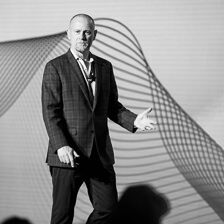
And so is the present and so was the past.
I’m loving the ongoing conversations that are happening around recent blog posts. Yesterday, Rebecca Conner Nemeth shared “Death To Bullshit” on Facebook in themed response to Nobody Is Smarter Than The Truth. I enjoyed the video. And what stood out for me were the questions Brad Frost asked before presenting his take on what to do about the deluge of information we’re faced with as billions of blog posts and tweets and photos and videos are fired at us from all angles, at all times.
What does it mean to be a professional photographer when over 3 billion people are walking around with phones in their pocket, with cameras on them? When Instagram is showing up on the New York Times home page? What does it mean to be a filmmaker in an age where anyone who can get their hands on a Red Camera can produce a hollywood level movie? What does it mean to be a musician when anybody can spend $50 on some software and create something that sounds like it came out of Nashville? What does it mean to be a writer, a professional writer, when every 14-year-old has a blog? What does it mean to be a designer when anybody who can access a serial code crack has the same tools as you? Any one of us could pull out our phones right now, click a few buttons and generate a website. What does that mean if you are a web designer?”
His response? Craft.
And I agree. I just don’t agree that anything has changed. Craft, focus, skill, practice, hard work, making things that are great… these things have always been the differentiator. Honing your craft is the key. Working at making what you do special is key. He continued, “The future is about focus.” And I say, the past was about focus. The present is about focus.
[vision_pullquote style=”3″ align=”right”] Our distractions are real. But they are are not unique to us or to our time. [/vision_pullquote]
His focus on the amount of data being generated by our culture is intended to point out that we have more distractions than ever before. More doesn’t mean greater. Every era, every culture, every circumstance has had its own distractions. Here in the comfort of our First World Western Society, ours appears to be too much information. This stands in stark contrast to the slums of Nairobi, Kenya, where it is not too many tweets and photos, it is finding water and wood to make a fire to boil the water so you can drink it without getting sick. If you want to be a professional photographer and you live in a Nairobi slum, you have to overcome that kind of “distraction,” you have to overcome your lack of access to tools, and find a way focus on your goal. You have to find a way to hone your craft.
I sat in amazement as I watched a national broadcast announcing Kenya’s top academic scores a few years ago. That year, the top score in Kenya’s national exam for college entrance was achieved by a young man who lived with his grandmother in a mud hut in rural Kenya. They had no running water, or electricity. He studied by candle light at night. He did this after his chores were finished. He had distractions. He overcame them.
Marcus Aurelius was a Roman Emperor who reigned from 161 – 180 A.D. He wrote Meditations, what is considered the greatest book on stoic philosophy, while on campaign against invading Germanic peoples from 170 – 180 A.D. His distractions are not our distractions, but I’m betting they were harder to overcome. In the first chapter of Meditations, titled, “Debts and Lessons,” he shares these lessons learned from various teachers:
- From Rusticus: “Not to be sidetracked by my interest in rhetoric. Not to write treatises on abstract questions, or deliver moralizing little sermons, or compose imaginary descriptions of The Simple Life or The Man Who Lives Only for Others.”
- From Rusticus: “To read attentively—not to be satisfied with “just getting the gist of it.”
- From Alexander The Platonist: “Not to be constantly telling people (or writing them) that I’m too busy, unless I really am. Similarly, not to be always ducking my responsibilities to the people around me because of “pressing business.”
- From Maximus: “Self-control and resistance to distractions.”
“Self-control and resistance to distractions.” Almost 2,000 years ago, in the midst of a war, he was writing advice that is just a powerful today as then. The past was about focus too.
There is a lot of crap swirling around us. That’s a fact. Our distractions are real. But distractions are are not unique to us or to our time. Our challenges are not greater. Our challenges are simply different. And the key to success in the face of those distractions is the same as it ever was – focus.

Well said.
I can’t remember where I heard it, but someone gave me the acronym follow one course until success, for focus. And, although it is a bit platitude-ish, it’s comes in handy when I’m inundated with distractions. Also, your time spent on writing, even in this short period, has really improved the quality and depth of the content.
Anyone now with án IPhone can do a watercolor, but you do not have the distractions of checking what you see, deciding what is important and what isn’t…
Possibly the only difference between then and now is that we’re subject to hundreds (thousands?) of opinions from every person who watches, looks at, reads, listens. After being inundated by opinions, our focus changes. “Oh, look, blogs are the way to get more business.” Then everybody runs in that direction. Facebook… Landing pages…